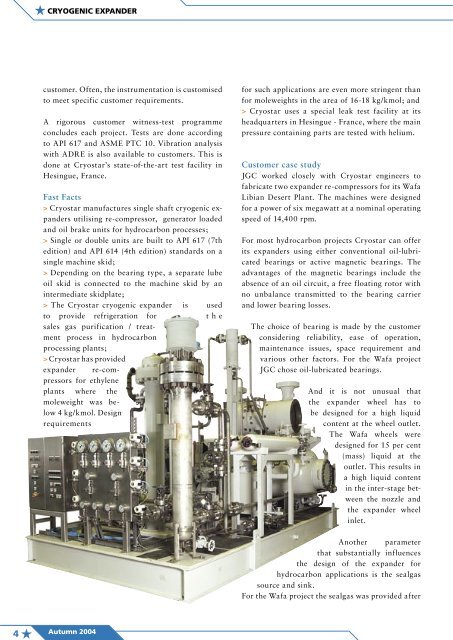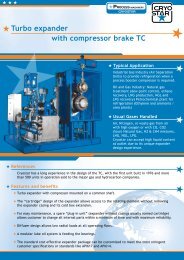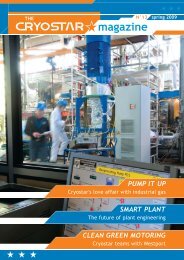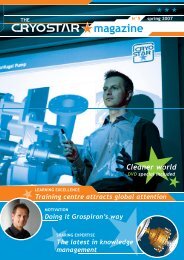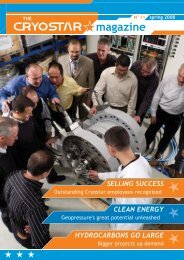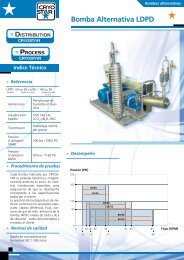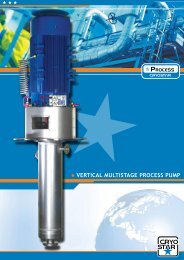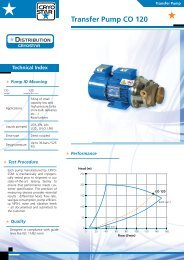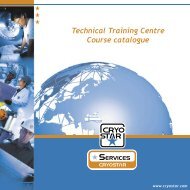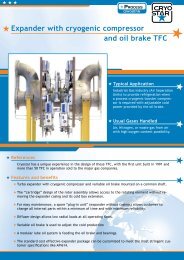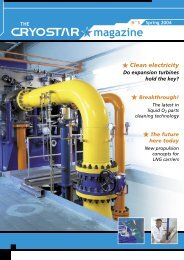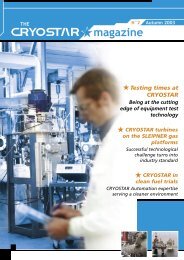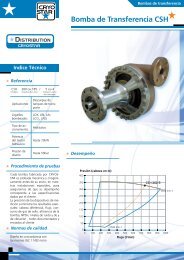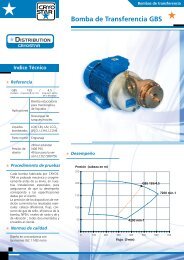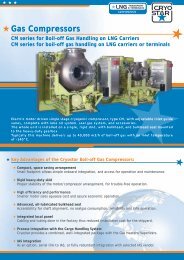The Cryostar Magazine N°4 : pdf file
The Cryostar Magazine N°4 : pdf file
The Cryostar Magazine N°4 : pdf file
You also want an ePaper? Increase the reach of your titles
YUMPU automatically turns print PDFs into web optimized ePapers that Google loves.
CRYOGENIC EXPANDER<br />
customer. Often, the instrumentation is customised<br />
to meet specific customer requirements.<br />
A rigorous customer witness-test programme<br />
concludes each project. Tests are done according<br />
to API 617 and ASME PTC 10. Vibration analysis<br />
with ADRE is also available to customers. This is<br />
done at <strong>Cryostar</strong>’s state-of-the-art test facility in<br />
Hesingue, France.<br />
Fast Facts<br />
> <strong>Cryostar</strong> manufactures single shaft cryogenic expanders<br />
utilising re-compressor, generator loaded<br />
and oil brake units for hydrocarbon processes;<br />
> Single or double units are built to API 617 (7th<br />
edition) and API 614 (4th edition) standards on a<br />
single machine skid;<br />
> Depending on the bearing type, a separate lube<br />
oil skid is connected to the machine skid by an<br />
intermediate skidplate;<br />
> <strong>The</strong> <strong>Cryostar</strong> cryogenic expander is used<br />
to provide refrigeration for t h e<br />
sales gas purification / treatment<br />
process in hydrocarbon<br />
processing plants;<br />
> <strong>Cryostar</strong> has provided<br />
expander re-compressors<br />
for ethylene<br />
plants where the<br />
moleweight was below<br />
4 kg/kmol. Design<br />
requirements<br />
for such applications are even more stringent than<br />
for moleweights in the area of 16-18 kg/kmol; and<br />
> <strong>Cryostar</strong> uses a special leak test facility at its<br />
headquarters in Hesingue - France, where the main<br />
pressure containing parts are tested with helium.<br />
Customer case study<br />
JGC worked closely with <strong>Cryostar</strong> engineers to<br />
fabricate two expander re-compressors for its Wafa<br />
Libian Desert Plant. <strong>The</strong> machines were designed<br />
for a power of six megawatt at a nominal operating<br />
speed of 14,400 rpm.<br />
For most hydrocarbon projects <strong>Cryostar</strong> can offer<br />
its expanders using either conventional oil-lubricated<br />
bearings or active magnetic bearings. <strong>The</strong><br />
advantages of the magnetic bearings include the<br />
absence of an oil circuit, a free floating rotor with<br />
no unbalance transmitted to the bearing carrier<br />
and lower bearing losses.<br />
<strong>The</strong> choice of bearing is made by the customer<br />
considering reliability, ease of operation,<br />
maintenance issues, space requirement and<br />
various other factors. For the Wafa project<br />
JGC chose oil-lubricated bearings.<br />
And it is not unusual that<br />
the expander wheel has to<br />
be designed for a high liquid<br />
content at the wheel outlet.<br />
<strong>The</strong> Wafa wheels were<br />
designed for 15 per cent<br />
(mass) liquid at the<br />
outlet. This results in<br />
a high liquid content<br />
in the inter-stage between<br />
the nozzle and<br />
the expander wheel<br />
inlet.<br />
Another parameter<br />
that substantially influences<br />
the design of the expander for<br />
hydrocarbon applications is the sealgas<br />
source and sink.<br />
For the Wafa project the sealgas was provided after<br />
4<br />
Autumn 2004


